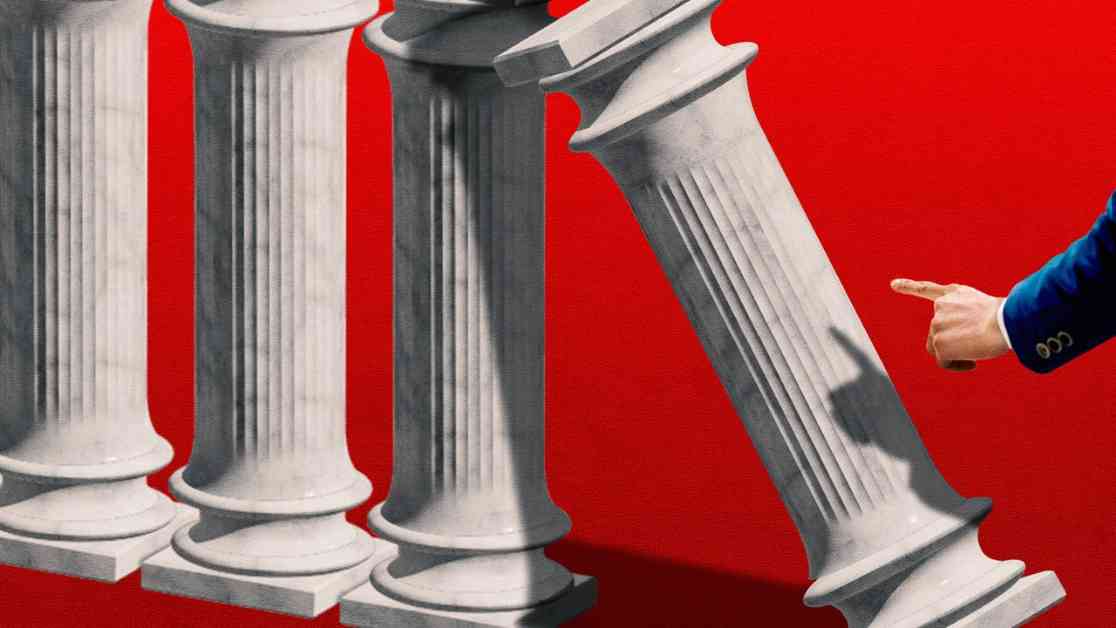Trump’s Defiance Strategy: Decoding the Legal Chess Game
In a thought-provoking essay from 1897, Oliver Wendell Holmes, Jr., a revered figure in the legal sphere, simplifies the essence of law as “the prophecies of what the courts will do in fact, and nothing more pretentious.” In this light, lawyers often find themselves in the role of predicting court decisions and advising clients on avoiding legal pitfalls. When examining President Donald Trump’s legal maneuvers during the early stages of his presidency, it becomes evident that a strategic game is at play, one that involves anticipating legal challenges and leveraging them to shape a constitutional narrative.
Navigating the Maze of Legal Battles
As the Trump Administration rolled out a series of executive actions, ranging from budget freezes to reshaping government agencies, legal experts foresaw a flurry of lawsuits challenging these measures. The calculated move was to provoke legal confrontations that could ultimately land in the highest court of the land—the Supreme Court. This deliberate strategy, cloaked in the chaos of rapid-fire policy changes, aimed to establish a constitutional framework centered on expansive executive authority.
Trump’s Legal Triumphs and the Path Forward
President Trump boasts a track record of legal victories, notably in cases such as Trump v. Hawaii and Trump v. United States, where allegations of unlawful conduct morphed into landmark decisions reinforcing executive power. Building on these past successes, Trump’s second term unfolds with a clear objective: to push the boundaries of executive authority and redefine the balance of power within the government.
Challenging Congressional Statutes: A Calculated Risk
One of the defining features of Trump’s legal strategy is the intentional flouting of congressional statutes that seek to limit his control over the executive branch. By openly disregarding established laws, such as those governing the removal of executive-branch officers, Trump’s legal team is laying the groundwork for potential clashes with Congress and the judiciary. The underlying premise? To assert the President’s supremacy over the executive apparatus.
The Tug of War Over Government Funding
A recent flashpoint in Trump’s legal saga revolves around the freezing of federal funds, pending a review to align spending with the President’s policy priorities. This move triggered a wave of legal challenges, with critics arguing that withholding funds infringes on Congress’s authority to allocate resources. While the legal landscape remains tumultuous, the Trump Administration’s stance hinges on a nuanced interpretation of executive discretion in fiscal matters.
Unraveling the Department of Government Efficiency Conundrum
Amidst the legal skirmishes, the Department of Government Efficiency (DOGE) emerges as a focal point of contention, with lawsuits questioning the ideological balance of its members and their access to sensitive government records. The intricacies of these cases underscore a broader debate on the limits of presidential power and the separation of powers doctrine. As legal battles intensify, the implications for executive authority hang in the balance.
A Future Defined by Legal Precedents
As the legal drama unfolds, one thing remains certain: Trump’s defiance strategy is reshaping the legal landscape and challenging conventional norms of governance. While some view these actions with skepticism, others see them as a necessary realignment of executive powers in a changing political landscape. The ultimate test lies in the courts, where Trump’s legal gambit will either solidify his vision of executive authority or face a reckoning with established legal principles.
In the realm of legal battles and constitutional interpretation, the clash between presidential power and institutional checks and balances continues to unfold. As the Trump Administration forges ahead with its defiance strategy, the repercussions of these legal maneuvers reverberate far beyond the courtroom. Whether history will judge these actions as bold assertions of executive authority or reckless overreach remains to be seen. One thing is certain: the legal legacy of the Trump era will leave an indelible mark on the fabric of American governance.












